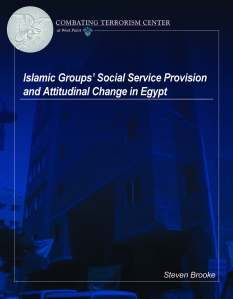Islamic organizations’ educational, medical, financial and charitable services benefit millions of Egyptians each year. Scholars and policymakers alike argue that, in the process of meeting Egyptians’ basic needs, this social-service provision Islamizes the population, acclimates them to the use of religiously justified violence, and aggravates sectarian attitudes. Yet authors rarely provide concrete data concerning these facilities, their history, the scope of the services provided, and the audiences they serve. Further, the attitudinal change supposedly under way is neither clearly observed nor easily measured. These twin deficits have limited the progress of research on an area of growing scholarly and practitioner interest. This paper improves on both of these areas. It uses a variety of primary and secondary sources to sketch the history and organizational capacity of three Islamic organizations’ social-service networks: those of the Muslim Brotherhood, al-Gam’iyya al-Shar’iyya, and Ansar al-Sunna al-Mohammediyya. It also reports the results of an original survey experiment of over 3,700 Egyptians, testing how exposure to information about these organizations’ service provision shapes individual attitudes on religiosity, violence, and sectarianism. While in many cases these primes fail to produce statistically significant shifts, results in both the religion battery and that regarding violence are notable. First, exposure to information about the Muslim Brotherhood’s social-service provision produces a significant and conservative shift in personal and social dimensions of religion. However, receiving information about the Brotherhood’s social-service provision makes respondents less likely to support a political role for religion. Second, receiving information about al-Gam’iyya al-Shar’iyya’s service provision shifts an individual’s propensity to tolerate violence in retribution for perceived provocations from non-Muslims.
 Skip to content
Skip to content

